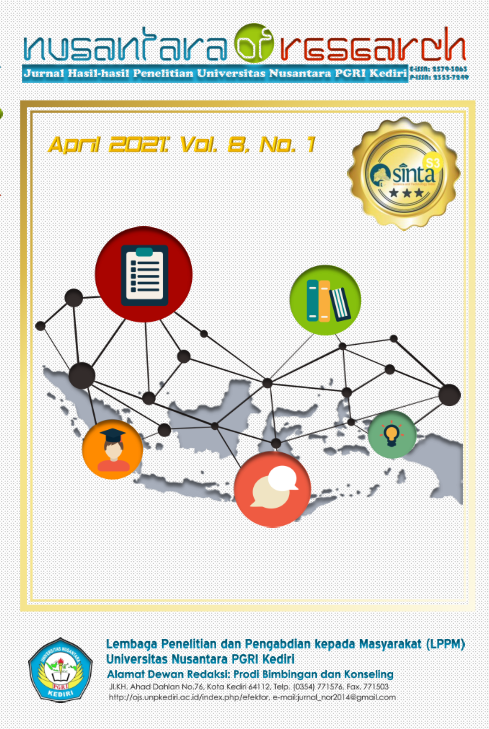Development Of Monobiling Game Media To Improve Student Academic Self-Efficacy At SMA Negeri 15 Surabaya
Main Article Content
Abstract
Media is part of the importance of the process of providing guidance and counseling services in schools. The media in this study was in the form of a monobiling game. Monobiling has educational value in increasing the confidence of the players (students). This study aims to determine how effective the use of monobiling game media is in increasing students' academic self-efficacy. The subjects (limited group) of this study used students of class XI who were active in SMA Negeri 15 Surabaya. This research method is in the form of development in order to produce products and product effectiveness testing. The data collection techniques in the study used interviews, media expert test instruments, and academic self-efficacy scales. Meanwhile, the data analysis used is an inter-rater agreement. Based on the results of the inter-rater agreement, it is known that the use of monobiling games to the academic self-efficacy of students in class XI at SMA Negeri 15 Surabaya is feasible and effective. This is intended to increase insight in the delivery of material regarding the academic self-efficacy of high school students. The contribution of this research is expected to optimize the game media in the implementation of guidance and counseling services
Downloads
Article Details
Issue
Section
Authors who publish with this journal agree to the following terms:
- Copyright on any article is retained by the author(s).
- The author grants the journal, the right of first publication with the work simultaneously licensed under a Creative Commons Attribution License that allows others to share the work with an acknowledgment of the work’s authorship and initial publication in this journal.
- Authors are able to enter into separate, additional contractual arrangements for the non-exclusive distribution of the journal’s published version of the work (e.g., post it to an institutional repository or publish it in a book), with an acknowledgment of its initial publication in this journal.
- Authors are permitted and encouraged to post their work online (e.g., in institutional repositories or on their website) prior to and during the submission process, as it can lead to productive exchanges, as well as earlier and greater citation of published work.
- The article and any associated published material is distributed under the Creative Commons Attribution-ShareAlike 4.0 International License
How to Cite
References
Ancok, D. (2002). Outbond and Training. Jogjakarta: UII Press.
Astiwi Kurniati, P. N. (2019). The Effectiveness of Group Counselling with Monopoly Game Media to Improve the Students’ Self-Confidence . 1st Borobudur International Symposium on Humanities, Economics and Social Sciences.
Bandura, A. (1986). Social Foundation of Thought and Action: A Social Cognitive Theory. Prentice Hall, Inc.
Bandura, A. (1997). Self-Efficacy: The Excercise of Control. New York.
Gregory, D. (2011). The everywhere war. The Geographical Journal, 177(3), 238–250.
Hara Permana, F. H. (2016). Hubungan Antara Efikasi Diri Dengan Kecemasan Dalam Menghadapi Ujian Pada siwa Kelas IX di MTS Al-Hikmah Brebes. Jurnal Hisbah.
Hernawati, Y. Z. (2015). Prokrastinasi Akademik Menghambat Peningkatan Prestasi Akademik Remaja di Wilayah Perdesaan. Jur. Ilm. Kel. & Kons, 163-172.
Lopez, C. R. (2006). Positive Psychology: The Scientific and Practical Explorations of Human Strengths. SAGE Publications.
Nurrita, T. (2018). Pengembangan Media Pembelajaran untuk Meningkatkan Hasil Belajar Siswa |. Misyikat.
Prasetiawan, H. (2017). Media Dalam Layanan Bimbingan dan Konseling. The 5Th Urecol Proceding, UAD Yogyakarta.
Pratiwi, H. M. (2013). Layanan Karier Melalui Media Permainan Monopoli Untuk Meningkatkan Kemantapan Pengambilan Keputusan Studi Lanjut . Jurnal BK UNESA, 183-190.
Pravesti, C. A. (2016). Hubungan Minat Belajar dan Motivasi Belajar Terhadap Prestasi Akademik Mahasiswa Jurusan Bimbingan dan Konseling Universitas PGRI Adi Buana Surabaya. Helper: Jurnal Bimbingan dan Konseling FKIP UNIPA Surabaya.
Puspitasari, W. D. (2016). Pengaruh Sarana Belajar Terhadap Prestasi Belajar Ilmu Pengetahuan Sosial di Sekolah Dasar. Jurnal Cakrawala Pendas.
Ragil, E., Ariyanto, R.D., Ratnawati, V., Ningsih, R., & Valdino, D.R. (2019). Keefektifan Teknik Modeling Berbasis Sinema Edukasi Untuk Meningkatkan Efikasi Diri Akademik Siswa SMP. Jurnal Nusantara of Research, 50-59.
Reswita, S. W. (2018). Efektivitas Media Pasir dalam Meningkatkan Kemampuan Konsep Bilangan pada Anak Usia 5-6 Tahun di Tk Aisyiyah Bengkalis. Lectura: Jurnal Pendidikan.
Rohmawati, S. (2019). Penerapan Hasil Modifikasi Permainan Monopoli Sebagai Media Pembelajaran Berbicara Bahasa Arab. Jurnal Al Mi'yar.
Sadiman, A. S. (2010). Media Pendidikan: Pengertian, Pengembangan, dan Pemanfaatannya. Jakarta: Rajawali Pers.
Sanjaya, A. (2017). Penerapan Teknik Permainan Monopoli Dalam Bimbingan Karier Untuk Meningkatkan Jiwa Berwirausaha Siswa di SMK Telkom Makassar. Jurnal Nalar Pendidikan, 562-571.
Sawitri, I. P. (2018). Dukungan Guru dan Efikasi Diri Akdemik Pada Siswa SMA Semesta Semarang. Jurnal Empati, 33-46.
Sdorow, L. M. (1990). Psychology 4 Edition. McGraw-Hill Publishing.
Suciati. (2020). Pengembangan Modul Permainan Monopoli Dengan Layanan Bimbingan Kelompok Untuk Meningkatkan Daya Ingat Belajar Pada Siswa di SMA Negeri 27 Banjarmasin. Jurnal Pelayanan Bimbingan dan Konseling, 159-162.
Sujiono, B. (2005). Menu Pembelajaran Anak Usia Dini. Jakarta: Yayasan Citra Pendidikan Indonesia.
Sukmadinata, N. S. (2016). Metode Penelitian Pendidikan. Bandung: PT. Remaja Rosdakarya.
Supardi. (2010). Penelitian Tindakan Kelas. Bandung: Bumi Aksara.
Weni Enjelina, A. F. (2020). Pengaruh Modifikasi Permainan Monopoli Terhadap Pengetahuan dan Sikap Siswa mengenai Keamanan Makanan Jajanan. Jurnal Kesehatan Masyarakat Indonesia, 29-34.




